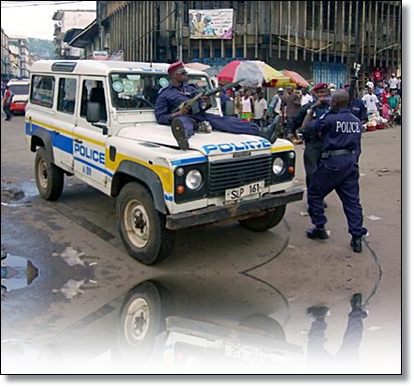Policing Sierra Leone Police

 |
|
Sierra Leone police in action Photo courtesy |
A police force that is not law abiding is, in the long-run, a dangerous threat to the smooth operation of the government. Therefore, it is always not in the long-term interest of any government to nurture a police force that is biased, unfair, corrupt, or that operates above/outside the law. Forward-looking governments always ensure that the police force operates within the laws of the state and evenly applies the law in enforcing law and order and protecting life and property.
Sadly though, most African governments and especially the governments of West African countries and even more so that of Sierra Leone simply do not share this crucial vision on the police force. The current roll of police force in Sierra Leone is simply not law-abiding, stands above the law, selectively applies the law, and openly exploits and abuses the law and the people. The Sierra Leone police force is further frustrating the efforts of well-meaning people and businesses to alleviate the sufferings of the nation.
We take, for instance, the transport sector of Sierra Leone. The APC government promised to secure 1000 buses in the 2012 elections campaign to ply Sierra Leone. Indeed after the elections, the government approached China on this matter and China donated a large fleet of buses to Sierra Leone. The fleet of buses has gone off the radar. During the 2012 elections, APC littered the cities of Sierra Leone with motor-bikes, nick-named “okada.” Now the government, the private sector and the police are all competing for business in public transport (“omo-rankay,” “okada,” taxi, “poda-poda,”) which the police is sure to win under the current circumstances. The police force is now the player and the referee in this life-line business of maintaining law and order and protecting life and property in Sierra Leone.
The Sierra Leone police force has resorted to very cruel tactics of unlawfully enforcing the law. In all civilized countries where there is rule of law, the police hands out tickets for minor traffic offenses. The violators are normally required by law to settle their fines in 21 days, failure of which the police can go out to track and bring the culprits to justice. In Sierra Leone today, however, the police heavy-handedly handles even very minor traffic violations. As along as the culprits are not working for police comrades, the police seize the drivers/riders along with their vehicles, rough them up and forcefully imprison them until the often bloated fines are settled by relatives or business associates of culprit drivers/riders. During imprisonment of culprit drivers/riders, the police even sometimes go to the extent of vandalizing seized vehicles, often targeting batteries and electronic gadgets of culprits’ vehicles.
Sierra Leone’s police has become a criminal force that even parks at wrong places. The largely illiterate “okada” riders and other public-transport drives are today the easy go-catches of the professionally criminalized police force. The APC government should re-tame its criminal police force and make it fully law-abiding. The criminalization of minor traffic offenses and brutalization of culprit riders/drivers is not acceptable. The people are already experiencing an unprecedented level of suffering in the country and the police force must work to ease rather than to worsen this plight.
God Bless Sierra Leone!
By Alpha P. Conteh.
